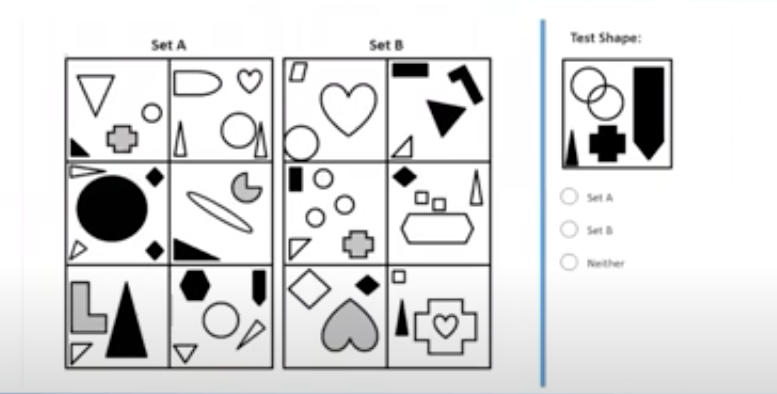The abstract reasoning portion of the UCAT tests your ability to spot patterns amongst shapes and ignore irrelevant or distracting material that’s designed to trick you. To succeed, you need to be able to come up with hypotheses and question judgements as you go, be flexible enough to change tack, and critically evaluate your thinking at each stage.
What Is The Abstract Reasoning Section?
The abstract reasoning section tests your abilities to evaluate and generate hypotheses and assesses critical thinking skills. This is important because Doctors deal with both reliable and unreliable information, and they need to make judgements based on possible diagnoses from test results.
You’ll be presented with shape-based patterns and sequences to assess your spatial awareness and reasoning.
There are 50 multiple choice questions, divided into a number of question sets. With 12 minutes to answer everything, this gives you just one minute per set.
Types Of Abstract Reasoning UCAT Questions
There are four types of abstract reasoning questions in the UCAT subtest:
- Type one: two ‘sets’ of shapes (Set A and Set B), followed by five ‘test shapes’. You must decide if the ‘test shapes’ fit Set A, Set B or neither set.
- Type two: a series of shapes that alternate from one box to the next. You need to state which of the four shapes would follow in the sequence.
- Type three: a ‘statement’ of two sets of shapes, where one has been changed to create a new set. You need to apply the same change to a set of test shapes and then choose which of the four options follows.
- Type four: like type one, but you’ll be presented with four ‘test shapes’ simultaneously and will need to decide which one of the four belongs to Set A or B.
How Is UCAT Abstract Reasoning Marked?
Each abstract reasoning question is worth one mark. Your total marks for the abstract reasoning subtest will be placed on a scale to give your UCAT score.
Average Abstract Reasoning UCAT Scores
Last year, the average abstract reasoning score was 659 for the UK – and it was 662 for ANZ.
What Is A Good Abstract Reasoning Score?
A good abstract reasoning score would be above the average, which was 659 in 2022 and 650 in 2021 for the UK.
Previous UK abstract reasoning scores:
| Average Abstract Reasoning Scores | 2016 | 2017 | 2018 | 2019 | 2020 | 2021 | 2022 |
|---|---|---|---|---|---|---|---|
| 630 | 629 | 637 | 638 | 653 | 650 | 659 |
Previous UCAT ANZ abstract reasoning scores:
| Average Abstract Reasoning Scores | 2020 | 2021 | 2022 |
|---|---|---|---|
| 644 | 650 | 662 |
For more on UCAT scoring, check out our UCAT Scores page.
Abstract Reasoning Strategies
The first strategy you need to unlock is the process for tackling every question. The key steps are:
- Ignore the test shape
- Look at the simplest box
- Identify the pattern
- Try to match to a test shape
We teach you how to identify the pattern in our UCAT courses. We tell you how you can work out what the shapes and patterns could be, and give you a mnemonic to help you remember the process.
You also need to learn when you should flag the question and move on so that you can review it at the end and not waste time.
However, you may not be aware that there are likely patterns and variances for the abstract reasoning subtest. This means you can learn what’s most likely to come up in the test. Once you’ve developed this abstract reasoning skill, you’ll be able to tackle any AR question!
Example Abstract Reasoning UCAT Question
Looking at the Set A and Set B shapes below, which of the sets does the Test Shape relate to?
Choose the answer:
- Set A
- Set B
- Neither

Abstract Reasoning Tips
Replay last year’s UCAT webinar to get some abstract reasoning tips.
